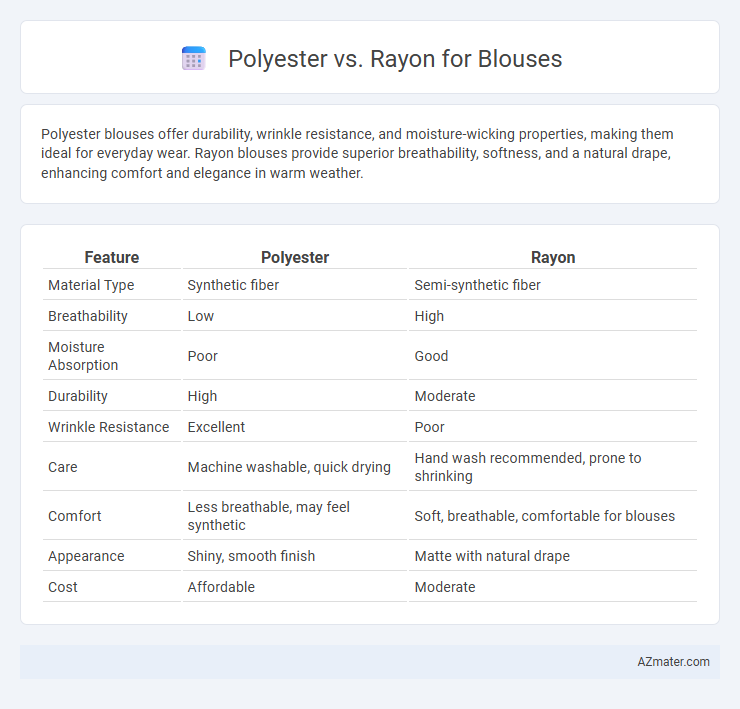Polyester blouses offer durability, wrinkle resistance, and moisture-wicking properties, making them ideal for everyday wear. Rayon blouses provide superior breathability, softness, and a natural drape, enhancing comfort and elegance in warm weather.
Table of Comparison
| Feature | Polyester | Rayon |
|---|---|---|
| Material Type | Synthetic fiber | Semi-synthetic fiber |
| Breathability | Low | High |
| Moisture Absorption | Poor | Good |
| Durability | High | Moderate |
| Wrinkle Resistance | Excellent | Poor |
| Care | Machine washable, quick drying | Hand wash recommended, prone to shrinking |
| Comfort | Less breathable, may feel synthetic | Soft, breathable, comfortable for blouses |
| Appearance | Shiny, smooth finish | Matte with natural drape |
| Cost | Affordable | Moderate |
Introduction to Polyester and Rayon Fabrics
Polyester is a synthetic fabric known for its durability, wrinkle resistance, and moisture-wicking properties, making it ideal for blouses that require easy maintenance and long-lasting wear. Rayon, a semi-synthetic fiber derived from cellulose, offers a soft, breathable, and lightweight texture, providing a comfortable and elegant drape often preferred in summer apparel. Both fabrics present distinct advantages for blouse construction, with polyester excelling in strength and resilience, while rayon is favored for its natural feel and aesthetic appeal.
Key Differences Between Polyester and Rayon
Polyester is a synthetic fiber known for its durability, wrinkle resistance, and moisture-wicking properties, making it ideal for long-lasting blouses. Rayon, a semi-synthetic fabric derived from natural cellulose, offers a softer texture and better breathability but tends to wrinkle easily and requires more care. The key differences lie in polyester's strength and low maintenance compared to rayon's comfort and natural feel, influencing blouse choice based on wearability and fabric performance.
Fabric Feel and Texture Comparison
Polyester fabric offers a smooth, slightly stiff texture with a glossy finish, providing wrinkle resistance and durability ideal for blouses worn in varied conditions. Rayon, made from natural cellulose fibers, feels softer and more breathable with a silk-like drape, enhancing comfort and providing a luxurious texture against the skin. While polyester maintains shape and resists moisture, rayon excels in softness and breathability, making fabric feel and texture key factors in blouse selection.
Breathability and Comfort Factors
Polyester blouses tend to have lower breathability compared to rayon, as polyester fibers trap heat and moisture, making them less comfortable in warm weather. Rayon, made from natural cellulose fibers, offers superior breathability and a softer, more lightweight feel, enhancing comfort during extended wear. Choosing rayon for blouses maximizes airflow and moisture absorption, which helps prevent overheating and skin irritation.
Durability and Longevity of Both Fabrics
Polyester blouses offer superior durability with resistance to stretching, shrinking, and abrasion, making them ideal for long-lasting wear. Rayon, while soft and breathable, tends to degrade faster with frequent washing and exposure to moisture, reducing its longevity. Choosing polyester ensures extended fabric life and less maintenance compared to the more delicate care requirements of rayon.
Care and Maintenance Requirements
Polyester blouses are highly durable, wrinkle-resistant, and easy to maintain, requiring simple machine washing and low ironing temperatures to preserve their shape and color. Rayon blouses, while offering a softer feel and better breathability, need gentle hand washing or delicate machine cycles, and must be air-dried flat to avoid shrinking or distortion. Proper care for rayon includes avoiding high heat during ironing and using mild detergents, ensuring the fabric retains its smooth texture and vibrant appearance.
Environmental Impact: Polyester vs Rayon
Polyester, derived from petroleum, is non-biodegradable and contributes significantly to microplastic pollution, posing long-term environmental challenges. Rayon, a semi-synthetic fiber made from cellulose, is biodegradable but often involves chemical-intensive manufacturing processes that can harm ecosystems if not managed responsibly. Choosing between polyester and rayon for blouses requires weighing the durability and recyclability of polyester against the renewable origin yet potentially toxic production of rayon.
Cost Effectiveness and Affordability
Polyester blouses are more cost-effective due to their lower manufacturing expenses and widespread availability, making them an affordable choice for budget-conscious consumers. Rayon, while offering a softer and more breathable fabric, often comes with a higher price tag because of its more complex production process. For those prioritizing affordability without compromising on durability, polyester remains the preferred material.
Best Uses for Blouses: Polyester vs Rayon
Polyester blouses offer excellent wrinkle resistance and durability, making them ideal for daily wear and professional settings where easy maintenance is crucial. Rayon blouses provide superior breathability and a soft, silky texture, perfect for summer outfits and occasions requiring lightweight, comfortable fabrics. Both materials suit different blouse styles depending on desired comfort, appearance, and care requirements.
Choosing the Right Fabric for Your Blouse
Polyester offers durability, wrinkle resistance, and vibrant color retention, making it ideal for blouses that require low maintenance and long-lasting wear. Rayon, known for its breathability and silky texture, provides comfort and a luxurious feel but may require more delicate care. Selecting between polyester and rayon depends on prioritizing fabric resilience versus softness and breathability for your blouse needs.

Infographic: Polyester vs Rayon for Blouse
 azmater.com
azmater.com